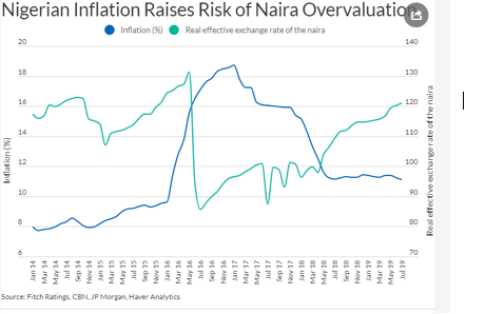

Fitch, a credit ratings international organisation has disclosed that the Central bank of Nigeria (CBN) under President Muhammadu Buhari might drag the Nigerian economy in crisis due to mismatch in economic policy management.
In the latest report released by Fitch, titled Nigeria’s Unconventional Policies Aggravate External Vulnerability, the organisation stated that the CBN’s recent attempt to boost economic activity through giving incentives to banks’ lending had clashed with the goal of maintaining a stable exchange rate, and this is not good for the economy.
Uncoordinated policies: Fitch noted that the CBN’s policy moves to reconcile competing goals through unconventional macroeconomic management and weaknesses in policy settings were raising medium-term vulnerabilities to shocks, and this could expose the economy more to falling oil prices or disruptions to hydrocarbon production.
– According to the report, tight management of domestic liquidity had been the key pillar of Nigeria’s exchange-rate policy in recent years.
– However, the recent measures to boost lending have contributed to a temporary loosening of domestic financing conditions. This has combined with falling oil prices and deteriorating investor sentiment towards emerging markets to put pressure on the naira.
– Specifically, one of the major policies cited by Fitch is the policy implemented in July, which includes a requirement for banks to have a loans-to-deposits ratio of at least 60% by the end of September and tighter restrictions on the amount of remunerable deposits that banks can park at the Central Bank.
Macroeconomic Pressures: Also, it was stated that exchange rate movement pressured the CBN to resume its liquidity tightening operations in August by auctioning Open Market Operations (OMO) bills, and to increase the supply of foreign currency, releasing about $800 million from its foreign-currency reserves between mid-July and mid-August.
– According to Fitch, these moves by the CBN have contributed to a rebound in domestic interest rates and limited the depreciation of the naira on the Investors’ and Exporters’ FX Window by 1% since the end of June.
– Hence, Fitch noted that the competing goals of preserving naira stability and supporting Nigeria’s fragile recovery were pushing the CBN towards increasingly complex policy measures, with a risk of aggravating external vulnerability or causing macroeconomic distortions.
– Fitch stated that the CBN’s policy of auctioning OMO bills to non-residents had led to a rapid build-up of short-term external liabilities with non-resident holdings of these bills amounting to $15.8 billion (4% of GDP) at end-April, equivalent to a third of reserves. This generates meaningful rollover risks, which could necessitate persistently high-interest rates, holding back growth and increasing the government’s debt-servicing costs
FOREX restriction on milk and food items: Fitch identified CBN’s recent move to intensify restrictions on FOREX access for imports that were imposed in 2015. While the President of Nigeria, Muhammadu Buhari, recently called on the CBN to end FOREX for milk importers, the President has also announced restriction of FX access for all food imports, but according to Fitch, the scope, modalities and timeline of such measures remain unclear.
Also according to Fitch, FX restrictions are unlikely to foster expansion in the domestic food supply, as Nigeria’s agricultural and food sectors suffer from deep-seated challenges from infrastructure gaps, communal conflicts, insecurity and weather hazards. Instead, these restrictions could push more traders towards the informal economy and compound inflationary pressures.
On Nigeria’s inflation, Fitch noted that Nigeria’s Inflation at about 11% already raises the risk of an overvaluation of the real effective exchange rate, which could put more pressure on the naira and increase the risk of a sharp adjustment following an oil price shock. Withdrawal of portfolio investors would aggravate the potential balance of payment pressures.



SPONSORED LINKS
[TRENDING SONG!!] Romani D-Fans – Bestie (Prod By Krizbeatz)
[TRENDING MIXTAPE!!] DJ Baddo – Bestie Unlimited Mix
[TRENDING SONG!!] TYSG Ft Bad Mz X Kendi Rozzi – Iyariya
INSTALL 9JAFLAVER MUSIC APP, STREAM, DOWNLOAD, AND PLAY MUSIC OFFLINE
CHECK OUT FUNNY PICTURE AND MEME HERE (CLICK HERE)
Chissom Anthony – Glory To God In The Highest [See Trending Gospel Song]
© 2014-2023 9jaflaver. All Rights Reserved.
About us | DMCA | Privacy Policy | Contact us
| Advertise| Request For Music | Terms Of Service
9jaflaver is not responsible for the content of external sites.